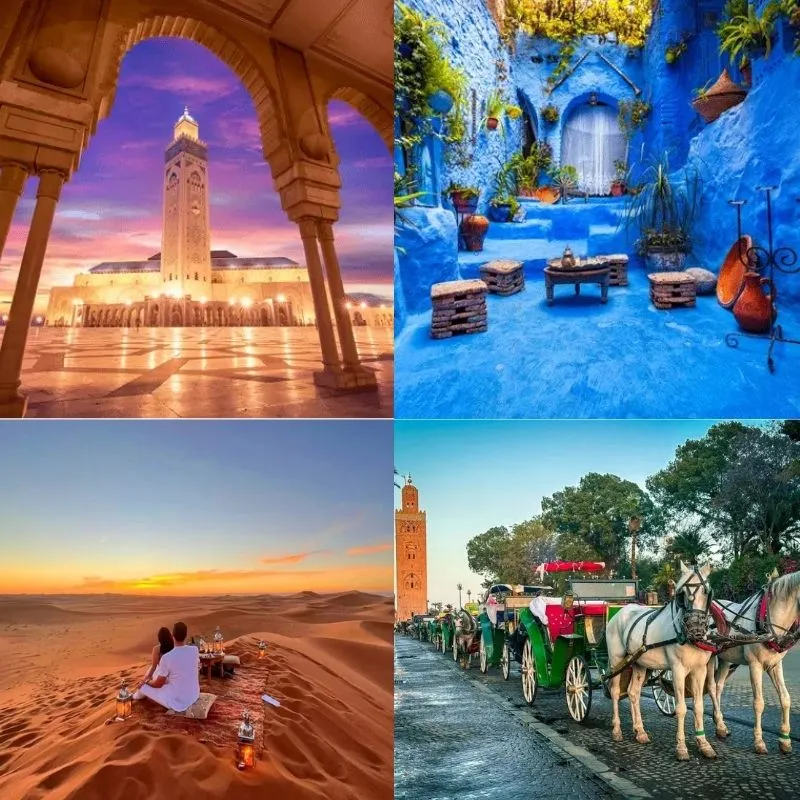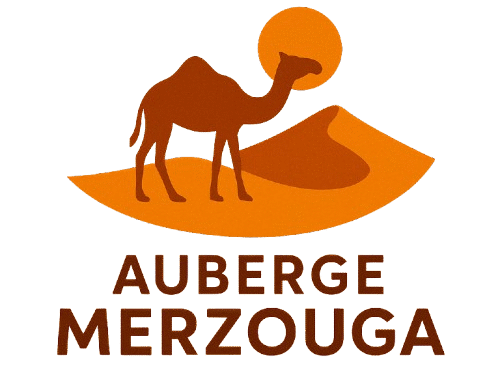Best Time to Travel to Morocco
Morocco is a land of contrasts: golden deserts, bustling medinas, rugged mountains, and picturesque coastal towns. Knowing the best time to travel will help you enjoy the perfect weather, cultural events, and unique experiences. In this guide, we provide detailed insights into seasons, climate, activities, festivals, and travel tips to help you plan your ultimate Moroccan adventure.

Understanding Morocco’s Climate
Morocco has diverse climates due to its geography:
- Coastal Areas (Casablanca, Essaouira, Rabat): Mild Mediterranean climate. Warm summers and cool, wet winters.
- Imperial Cities (Marrakech, Fes, Meknes): Hot summers and cool winters, with occasional rain.
- Sahara Desert (Merzouga, Erg Chebbi): Extreme temperature variations: scorching days in summer and cold nights in winter.
- Atlas Mountains: Snowy winters ideal for skiing; spring and autumn are perfect for trekking and exploring valleys.
Seasonal Guide to Visiting Morocco
Spring (March to May)

Spring is widely regarded as the best time to visit Morocco. The weather is mild, landscapes are blooming with colorful flowers, and it’s ideal for both desert tours and mountain treks.
- Average temperature: 20°C–25°C
- Activities: Desert camping, camel trekking, hiking in Atlas Mountains, exploring cities
- Highlights: Blooming roses in Kelaa M’Gouna, festivals, moderate crowd levels
Summer (June to August)

Summer can be extremely hot in inland cities and the Sahara Desert. Coastal regions like Essaouira and Casablanca remain cooler. Early morning or late afternoon tours are recommended to avoid high temperatures.
- Average temperature: 30°C–40°C in the desert, 25°C–30°C on the coast
- Activities: Coastal visits, evening desert tours, swimming, festivals
- Travel tips: Carry sunscreen, hats, and stay hydrated; avoid peak afternoon desert trekking
Autumn (September to November)

Autumn offers mild weather, fewer tourists, and excellent conditions for desert and mountain adventures. Night temperatures in the Sahara are more comfortable, and city exploration is pleasant.
- Average temperature: 22°C–28°C
- Activities: Desert excursions, hiking, cultural tours, photography
- Highlights: Sunset & sunrise experiences, cultural events, less crowded destinations
Winter (December to February)

Winter is mild along the coast, cool in cities, and cold at night in the desert. Snow covers the Atlas Mountains, making it a good time for skiing enthusiasts.
- Average temperature: 10°C–18°C
- Activities: City tours, desert adventures (with warm clothing), mountain trekking, skiing
- Travel tips: Bring layers for desert nights and mountain trips
Top Festivals & Cultural Events
Morocco is a country rich in traditions and festivals. Time your visit to experience vibrant cultural events:
- Fez Festival of World Sacred Music (June): Music from around the globe in historic venues
- Marrakech Popular Arts Festival (July): Traditional Moroccan arts and performances
- Rose Festival in Kelaa M’Gouna (May): Celebrates rose harvest in Atlas Mountains
- Timitar Festival in Agadir (July): Mix of local and international music
- Imilchil Marriage Festival (September): Traditional Berber wedding celebrations in the Atlas
Activities by Region
Sahara Desert Adventures

Merzouga and Erg Chebbi offer unparalleled desert experiences. Camel trekking, 4×4 excursions, sandboarding, and nights under the stars are best enjoyed in spring and autumn.
Atlas Mountains Exploration

High Atlas and Middle Atlas provide trekking, cultural village visits, and scenic photography. Spring and autumn are ideal for trekking, while winter is suitable for skiing in Oukaimeden.
Imperial Cities & Coastal Regions
Marrakech, Fes, Rabat, and Casablanca offer historical tours, markets, palaces, and cuisine experiences. Coastal towns like Essaouira provide cooler summer temperatures, beaches, and seafood delights.
Travel Tips for Morocco
- Carry sun protection: hats, sunglasses, sunscreen.
- Bring warm clothing for desert nights and Atlas Mountains winter trips.
- Plan desert tours early in the morning or late afternoon during summer.
- Check local holidays like Ramadan for potential schedule changes.
- Book accommodations and tours in advance for spring and autumn seasons.
- Learn basic Arabic or French phrases for better cultural interaction.
“Morocco is a year-round destination, but your experience will greatly improve if you plan according to climate, festivals, and activities.”
Conclusion
The best time to visit Morocco depends on your preferred activities and regions. For a balanced mix of pleasant weather, cultural events, and desert adventures, spring (March-May) and autumn (September-November) are the ideal times. Winter is great for city exploration and mountain skiing, while summer suits coastal travelers seeking warm weather. Plan your trip with this seasonal guide to enjoy Morocco to the fullest!
Explore Morocco Tours